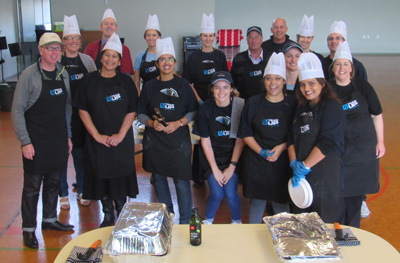Companies are increasingly incorporating opportunities for their meeting and incentive delegates to do good for the community of the destination where their event is hosted. By Karen Yue, with inputs from Paige Lee Pei Qi, Julian Ryall, S Puvaneswary, Rebecca Elliott, Rosa Ocampo, Prudence Lui and Michael Mackey

Here are some outright good news: the number of corporate meetings and incentive programmes that feature Corporate Social Responsibility (CSR) objectives has spiked over the past few years, with corporate event specialists reporting increments ranging between 15 per cent and 100 per cent.
When MCI conducted its 2015 Annual Client Sustainability Survey, it found that 95 per cent of its clients make sustainability a key consideration when planning their events, up from 25 per cent in 2011. Ninety per cent of clients have their own sustainability programmes (up from 15 per cent in 2011) while 68 per cent evaluate the sustainability of their supply chain (up from 25 per cent in 2011).
At FCm Travel Solutions Singapore, client requests for CSR activities have doubled over the past three years, according to Theresa Lee, head of MICE. Six out of 10 meetings and incentives it organises today feature CSR components.
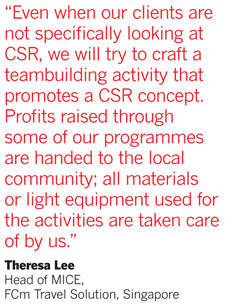
Lee said: “We have received frequent requests (from our clients) to incorporate CSR activities into their meetings and incentive trips in an effort to build care and concern for people, planet and profit. That translates to a sustainable business and the environment they operate in.”
The numbers have also risen for Intas Destination Management in the Philippines – seven out of 10 meetings and incentive programmes today include a CSR activity compared to just three years ago, said Kevin Jemel Hinahon, marketing and MICE manager of the agency.
Hinahon said many of his clients today take the initiative to make that request, and the change is a welcome one.
He said: “This is a win-win situation. (CSR activities) make the trip memorable and meaningful. The trip will not only help individuals, it also inspires the participants and bolsters their spirit of volunteerism.”
Destination Asia Japan, which was established five years ago, has seen CSR inclusions blossom from “being very rare then to accounting for one in four today”, revealed its managing director, Jared Stenhouse, who added that “it is becoming standard for us to include a CSR component (in our response to) an RFP for an incentive project”.
Some event specialists said international firms with vast experience in organising business events are the main drivers of this growing interest in CSR achievements as part of business events.
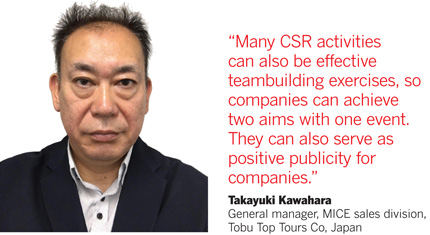
Takayuki Kawahara, general manager of MICE sales division, Tobu Top Tours Co in Japan, observed that large companies, especially international pharmaceutical firms, were putting in the most requests for CSR activities, while Hinahon said his foreign clients were the most active champions.
What drives the desire?
There are various reasons, from an altruistic desire to leverage corporate power and a strong headcount during business gatherings to help the less fortunate in the destination hosting the event, to a more pragmatic need to appear as a responsible corporate citizen under public scrutiny.
Lee believes that the expanding millennial workforce is particularly driving the altruistic push.
She said: “The millennial generation grew up with the Internet and is well informed of global issues, especially those facing the underprivileged and the environment. They are always looking for ways to contribute to the betterment of their local communities and to society.”
And companies seeking to win loyalty from the millennials and retain talent are discovering that they need to be socially responsible too.
“A strong CSR policy is a strategic tool used to attract and retain talent for the business. By providing the employee with the opportunity for individual contribution towards the greater good of a cause, the community or the environment, the company helps the employee to foster a sense of belonging and a feel-good factor about themselves and the employer,” she added.

Talan Miller, managing director of Sabre Corporate Development, Australia, said: “The millennials – be they staff or customers – certainly seem to demand more community-minded values from the big brands. In reality, while some may have genuinely grown in altruism, I think that global connectedness and social media are actually holding some big brands far more accountable to their negative actions in some markets these days. So some seek to add some community credibility and charm to their brands or assuage some guilt after a certain major image crisis.”
Whatever the reason is for the CSR inclusion, Miller offers one invaluable advice to companies: ensure a balance in the contribution to charity and the cost of staging the event.
He elaborated: “We once saw a client donate approximately A$2,000 (US$1,468) worth of bikes, then with the charity representative still in the room, they gave about A$6,000 worth of fashion sunglasses as prizes to the winning teams from the team challenge linked to the donation. This looked a little shallow and hypocritical to external observers.”
Adding quality flesh to the bone
The growing implementation of CSR activities as part of a business programme is also simply to better engage an increasingly discerning audience.
Max Jantasuwan, group managing director of Events Travel Asia, Thailand, said: “Corporate clients are now looking at different ways to reward their staff and promote work-life balance. Incorporating CSR in meetings and incentive programmes rewards participants in a spiritual way and engages the team to look at life differently and appreciate what they have achieved.”

Stu Robertson, managing director of Team Up Events in New Zealand, agrees.
He said: “For a lot of (clients), creating a memorable experience for their participants and linking that with the community in the destination (and the organisational values is key). Incorporating a sense of giving can help create that memorable experience.”
Stenhouse added that business event participants “are looking for more ways to get involved in the destination they are visiting”.
He said: “They don’t want to just sit on the coach and watch things pass by; they want hands-on experiences.”
Furthermore, with corporate budgets for incentives being tightened these days, CSR activities are all the more attractive because they can can add substance to a reward programme without being seen as a cost, Stenhouse reasoned.
What works?
CSR programmes that benefit children and youths, and those that come with immediate and obvious results appear to be a hit, according to event specialists that spoke to TTGmice.
Brett Hollis, owner of Big Stick Adventures, Australia, found that activities that have an impact on other people and can provide an immediate visual, educational and emotional result are more popular with corporate clients, in particular those that reach out to disadvantaged and disable youths and transparent organisations with a blue ribbon vision (in support of child abuse prevention) and cause.
Robertson found that CSR activities that “deliver the biggest impact… and create the biggest smiles” and whose beneficiaries are included in the business event at some stage, are preferred.
Hinahon said activities that empowered local communities to make a sustainable livelihood are also popular, while Tokyo-based Event Services, Inc’s Lucky Morimoto said clients desired programmes that allowed their staff to interact with the locals as that will form part of the training or education.
Swire Travel Hong Kong’s senior manager, Eva Lai, said tree-planting in China are preferred by her clients in Hong Kong as “it is easy to handle and can accommodate groups of all sizes”, but added that they generally prefer to implement CSR activities on homeground.
Miller opined that while hands-on activities and visits to charity organisations might be great, companies should first consider how useful the donation or activity would be to the beneficiary.
He said: “The thing most charity projects actually need is cash to spend. It is just harder to make cash appear warm and fuzzy for those (incorporating a CSR element) with a pure event focus.
“A nice example was a global engineering firm that ran an A$2,500 teambuilding event to link to an A$12,000 donation to charity. There wasn’t a big song and dance over the donation, as it was just done because the senior leadership had a genuine desire to make a difference.”
Lee also advised care when selecting a local organisation to work with.
“We do our due diligence and conduct background checks on the selected organisations to make sure their books are in order and that they are not linked to any known scams or human trafficking/child labour issues,” she said.
“Corporations may also want to pay attention to the emotional impact of certain CSR activities on their staff,” suggested Brian Kock, senior manager – destinations & events management, Swire Travel Hong Kong.
“Once, we proposed a visit to some soldiers (who were maimed in battle) but that was rejected because it was too impactful on the delegates.”
Destination considerations
As business events have corporate objectives to fulfil, destination choices will not be influenced by the availability of CSR opportunities, as rightly pointed out by Sumate Sudasna, managing director of CDM – Conference & Destination Management, Thailand, who remarked that “(event delegates) do not travel to save the world”.
However, Sabre’s Miller said: “It does compel them to look deeper at what stark contrasts might exist between their five-star resort and the poor local villages.When it crosses their minds that just 25 per cent of their gala dinner’s bar bill might save lives, provide safe housing or train several teachers, it can be a sobering experience. When carefully planned, these feelings can help lead to increased awareness and advocacy of local CSR issues.”
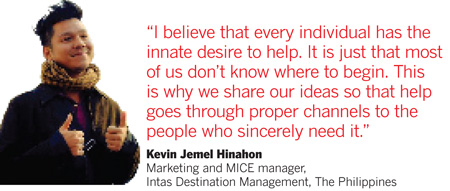
Hollis believes that every destination offers worthy causes for corporations to fight for and it is up to the client to decide which best fits their corporate CSR ambitions and culture.
Even Japan, a first-world country, can offer up impactful CSR opportunities, said Stenhouse.
“We had some projects in Fukushima and Tohoku which were badly hit by the March 2011 earthquake and tsunami. We brought groups to the temporary housing units for survivors and ran some English language classes. Even just bringing tourism business into these areas is a big help,” he said.
Kawahara added that event delegates visiting Japan are also able to volunteer at sports events and take part in tree-planting activities.
Max said the growing demand for CSR inclusions within business events has made it necessary for event specialists like himself “to be more creative in tailoring CSR programmes that cater to the client’s corporate identity” while using available resources.
Diethelm Travel Group, which has strong local networks in the Asia destinations it operates in, is able to “provide all our clients with CSR activities wherever the destination our client chooses, be it Cambodia, Laos, Thailand or Myanmar”, said Jeremie Descelles, sales and account director (MICE, France, Africa and Asia).
Expecting the demand for CSR activities to rise further, Kawahara concluded that event specialists “need to be ready for that”.
Leading by good example
From cooking for impoverished children in Auckland to saving a protected bear species in Laos, event specialists show that there are many ways to do good while meeting for business
Spreading the love to brother bear
 A Singapore-based investment company – a client of FCm Travel Solutions Singapore – wanted to introduce a CSR experience for the first time to its corporate retreat. The experience involved a fundraising campaign within the different teams in the company, and part of the Key Performance Indicators (KPIs) of the investment teams went towards this company-wide initiative.
A Singapore-based investment company – a client of FCm Travel Solutions Singapore – wanted to introduce a CSR experience for the first time to its corporate retreat. The experience involved a fundraising campaign within the different teams in the company, and part of the Key Performance Indicators (KPIs) of the investment teams went towards this company-wide initiative.
Luang Prabang was the chosen destination. FCm Travel Solutions Singapore worked with its local vendor, EXO Travels, to propose the Free the Bears programme.
The group visited the Bear Rescue Centre at Nam Kan natural protected area, home to the largest community of protected Moon Bears (also known as Asian Black Bears) in Laos. Participants were given a project overview before being taken on a behind-the-scenes tour of the sanctuary. They also learnt how the bears were taken into care after their rescue, heard the stories of how each bear came to live at this sanctuary, what they were being hunted for and how Bear Rescue Centre continues its mission to protect, preserve and enrich the lives of bears in six countries – Cambodia, India, Indonesia, Laos, Thailand and Vietnam.
Donations raised through the Free the Bears programme went towards food, medical and care for the bears.

A contribution to green education
 MCI Asia Pacific helped client Symantec sponsor and co-organise a Plant-for-the-Planet Academy (an official UN education project) for a group of children as part of the company’s Vision Symposium.
MCI Asia Pacific helped client Symantec sponsor and co-organise a Plant-for-the-Planet Academy (an official UN education project) for a group of children as part of the company’s Vision Symposium.
During the Academy, professionals educated the children about environmental issues and inspired them to become Climate Justice Ambassadors by equipping them with the skills to educate their own friends and family about the importance of the environment.
As a result, the achievements saw US$10,000 donated by Symantec to sponsor the Academy, and 43 children between the ages of eight and 14 became Climate Justice Ambassadors.
Also, 19,228 pledges to plant trees were collected and US$15,000 was donated by Symantec to plant trees in Campeche, Mexico.

A talent for fund-raising
 The Nu Skin Got Talent Show was a single-night event during the 2014 Nu Skin Greater China Regional Convention, where the global wellness company arranged for its distributors to form teams and put up a talent showcase, effectively marrying entertainment, team-bonding opportunities and charity. To vote for their favourite team, the audience had to purchase voting tickets and sales proceeds were channelled to the Nu Skin Force for Good Foundation which supports humanitarian projects in more than 50 countries.
The Nu Skin Got Talent Show was a single-night event during the 2014 Nu Skin Greater China Regional Convention, where the global wellness company arranged for its distributors to form teams and put up a talent showcase, effectively marrying entertainment, team-bonding opportunities and charity. To vote for their favourite team, the audience had to purchase voting tickets and sales proceeds were channelled to the Nu Skin Force for Good Foundation which supports humanitarian projects in more than 50 countries.
Various charity sales booths were also set-up at the convention, to raise additional funds for the Foundation.
According to Avis Chau, vice president of Nu Skin Greater China Success Inspirations and general manager of Nu Skin Hong Kong and Macau, both the Nu Skin Got Talent Show and charity booths raised HK$2 million (US$257,625). This amount went into supporting charity projects in Greater China including the Nu Skin Greater China Children Heart Fund.
Helping nature along
 A group of 100 delegates from a Malaysian education sector held a two-day CSR programme in the Setiu Wetlands in Terengganu this January. Put together by local DMC Ping Anchorage Travel & Tours in partnership with local non-profit organisation Sahabat Setiu, the programme saw the delegates learn about the importance of the mangrove ecosystem and take part in activities such as releasing terrapins into the river, planting 500 mangrove seedlings and clearing rubbish in the Setiu Wetlands area.
A group of 100 delegates from a Malaysian education sector held a two-day CSR programme in the Setiu Wetlands in Terengganu this January. Put together by local DMC Ping Anchorage Travel & Tours in partnership with local non-profit organisation Sahabat Setiu, the programme saw the delegates learn about the importance of the mangrove ecosystem and take part in activities such as releasing terrapins into the river, planting 500 mangrove seedlings and clearing rubbish in the Setiu Wetlands area.
Alex Lee, CEO of Ping Anchorage Travel & Tours, said: “(The programme) also benefitted the local community in Setiu as (its people) were paid for helping with the tree-planting, and for demonstrating how mats and baskets are made using plants from the wetlands.”

Experimenting with tea leaves
 A group of 50 German delegates who were in China for a meeting and incentive sought out a CSR activity that promotes sustainable tourism.
A group of 50 German delegates who were in China for a meeting and incentive sought out a CSR activity that promotes sustainable tourism.
 The handling agent, Germany-based Globalevents, organised a tea plantation activity that gave delegates an understanding of cultural preservation and sustainable agriculture. The highlight of the day was the hands-on tea-growing experience during which a specialist detailed the different methods of the tea-growing process. The group got to learn how to choose and pluck tea leaves, and at the end of it, brewed their own tea using the leaves they had plucked.
The handling agent, Germany-based Globalevents, organised a tea plantation activity that gave delegates an understanding of cultural preservation and sustainable agriculture. The highlight of the day was the hands-on tea-growing experience during which a specialist detailed the different methods of the tea-growing process. The group got to learn how to choose and pluck tea leaves, and at the end of it, brewed their own tea using the leaves they had plucked.
According to Frauke Melchert, senior sales manager MICE with Globalevents, the delegates were all very pleased as the experience was unique and they could try the fruits of their labour.
A tale of green commitment
 When a major Japanese finance company took 400 employees to New York for a week-long incentive trip, it obtained permission from the authorities to plant a tree sapling in Central Park. According to Japan’s Event Services, Inc, president Lucky Morimoto, the client was keen to promote a message of environmental responsibility as well as lasting friendship between the US and Japan. Planting a tree was seen to satisfy both.
When a major Japanese finance company took 400 employees to New York for a week-long incentive trip, it obtained permission from the authorities to plant a tree sapling in Central Park. According to Japan’s Event Services, Inc, president Lucky Morimoto, the client was keen to promote a message of environmental responsibility as well as lasting friendship between the US and Japan. Planting a tree was seen to satisfy both.
Furthermore, the project was warmly welcomed by the company as it could be revisited by employees for many years.
A vision for a happy world
 In April 2016, Sabre Corporate Development handled a group of 100 global leaders and their partners from a major international software company and helped delivered a CSR event in Gold Coast, Australia.
In April 2016, Sabre Corporate Development handled a group of 100 global leaders and their partners from a major international software company and helped delivered a CSR event in Gold Coast, Australia.
As the client had global operations, it requested a programme that would deliver equally far-reaching results. As such, Sabre used World Vision, an international humanitarian aid organisation, and its Smiles programme as the medium.
Following a three-hour conference and teambuilding activity, the group chalked up dozens of education packages, vaccinations, water projects, livestock animals, solar lights, seeds and other items that were eventually donated globally via World Vision.
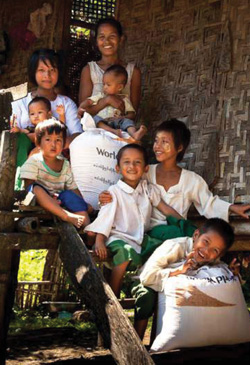
Satiating a need to feed
 Some 25 participants from Tonkin and Taylor, a multinational engineering company, visited a low socio-economic school in Auckland to participate in a Feed the Need programme. Their challenge was to prepare, cook and serve lunch for 75 school kids.
Some 25 participants from Tonkin and Taylor, a multinational engineering company, visited a low socio-economic school in Auckland to participate in a Feed the Need programme. Their challenge was to prepare, cook and serve lunch for 75 school kids.
A Tonkin and Taylor representative said: “We got way more out of the programme than we ever expected – it was a great feeling and we came away a little awed by the kids’ talent and were hugely impressed with all the organisation that had happened behind the scenes.”
